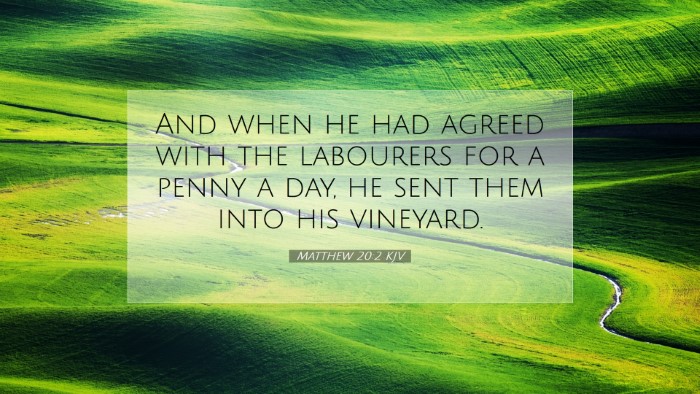Commentary on Matthew 20:2
The context of Matthew 20:2 occurs within the parable of the laborers in the vineyard, illustrating key theological themes through the actions and decisions of the landowner. The verse itself reads:
"And when he had agreed with the laborers for a penny a day, he sent them into his vineyard."
Here, we will synthesize insights from esteemed public domain commentaries to provide a rich theological and practical understanding of this verse.
Contextual Background
In understanding Matthew 20:2, it is essential to note its place within the narrative of Matthew 20. Jesus has just spoken of the difficulty for a rich person to enter the Kingdom of Heaven (Matthew 19:24). Following this, the parable established provides spiritual lessons on grace, equality, and God's generous nature.
Insights from Commentators
Matthew Henry’s Commentary
Matthew Henry emphasizes the equality expressed in this parable, where laborers are invited to work in the vineyard, establishing a bond of agreement. He notes that the "penny" refers to a denarius, the typical wage for a day's labor, symbolizing the fairness and justice of the landowner.
Henry suggests that the landowner's willingness to negotiate a wage reflects God's invitation to humanity. He writes:
"It is a call of grace that invites us to labor, not merely an employment of necessity.”
From this viewpoint, the hired workers also represent those who respond to God's call, emphasizing that God engages with humanity on a basis of agreement and expectation.
Albert Barnes’ Notes
Albert Barnes expands on the cultural and economic implications of the parable. He explains that the act of hiring laborers at the beginning of the day illustrates God's orderly approach to divine justice, where He provides for those who respond to His call.
- Assessment of the Wage: Barnes highlights that the "penny" is not merely a wage but God's assurance of eternal life for those who enter His kingdom, reinforcing the idea of grace over merit.
- Relational Dynamics: He points out that the agreement signifies the relationship between the laborer and the landowner, akin to that between believers and God, marked by clarity and commitment.
Thus, Barnes emphasizes the importance of understanding God's provisions in relation to human agreement and labor within the kingdom of heaven.
Adam Clarke’s Commentary
Adam Clarke offers a deeper analysis of the laborer's agreements and the socio-economic climate of the time. He observes that hiring laborers early in the day demonstrates the urgency and importance of the vineyard's work in the culture of the agricultural society depicted in the parable.
Clarke states:
"This agreement signifies the terms of service God requires from us, which are based on simple faith and obedience."
Clarke also underscores the significance of the vineyard as representative of God's Kingdom, where the laborers symbolize those who have entered into partnership with God for the harvest of souls.
Theological Implications
This verse, by addressing the dynamic of agreement in the context of labor, sheds light on several critical theological themes:
- Divine Sovereignty: The landowner represents God's sovereign choice in calling individuals into His service, underscoring that it is ultimately God's prerogative who He invites into His vineyard.
- Grace vs. Works: The penny symbolizes the grace offered to believers, transcending mere human effort or labor. The theological implication is the radical grace of God that does not depend on the amount or quality of work performed.
- Invitation to Service: The act of hiring laborers signifies God’s active invitation. This highlights the ongoing nature of the gospel call to all of humanity, as well as the urgency of the mission field that requires immediate attention.
Practical Applications for Thinkers and Doers
For pastors, theologians, and students of the Bible, understanding Matthew 20:2 can inform various areas of ministry and personal practice:
- Embracing God's Generosity: Pastors should express God's generosity in their teachings, reminding congregants that salvation and God's gifts are not earned but given freely.
- Encouraging Faithful Labor: It serves as a challenge to believers to actively engage in their faith - to labor diligently in the Lord's vineyard, knowing that God meets their needs regardless of their past or present works.
- Understanding God's Call: This verse provides a framework for understanding the unique yet equal calling of all believers, regardless of the nature of their labor or the timing of their call, emphasizing the value of each soul in God's economy.
- Recognition of the Breadth of God's Kingdom: The diverse nature of those hired into the vineyard reflects the inclusiveness of God's grace, compelling churches to welcome all individuals into their ministry.
Conclusion
Matthew 20:2 encapsulates profound truths about God’s just and grace-filled nature towards humanity. Through the lens of various esteemed Biblical commentaries, it becomes evident that the Kingdom of Heaven operates radically different from worldly systems. By synthesizing the insights of Henry, Barnes, and Clarke, we gain a dynamic view of divine economics that invites believers into fruitful labor while assuring them of God's generous provision.


